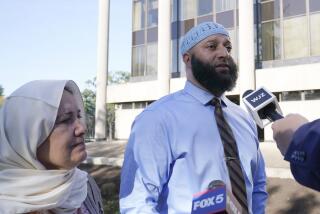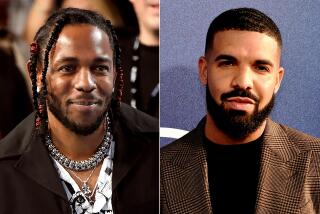Auto Mechanic Acquitted in Teen’s Death
As the verdict was read, the mother of 17-year-old Leonard Anthony Coppola--who was shot to death by a Simi Valley auto mechanic in late 1997--let out a heart-wrenching sound, threw her head down and began sobbing.
When Superior Court Judge Ken W. Riley thanked the jurors for their dedicated effort, Coppola’s stepfather, Thomas Kestly, yelled, “I don’t think so.”
And as the two rushed from the courtroom, Coppola’s mother in tears, Kestly turned toward his stepson’s killer--52-year-old Edward Nishida Drake--raised his arm in an obscene gesture, and cursed at him.
Drake himself sat straight and silent at the defense table, letting the news of the verdict sink in. After minutes passed, he smiled.
Jurors acquitted the Mercedes-Benz/BMW repair shop owner of all charges Thursday, freeing the man who fatally shot a teenager who he knew and liked.
The verdict was returned a day after the jury told the judge they had verdicts on the two more serious charges of second-degree murder and voluntary manslaughter, but were deadlocked 11 to 1 on a lesser charge of involuntary manslaughter. The jurors did not say which way they were leaning.
Rather than declare a mistrial, Riley sent them home for the night and asked them to poll themselves one more time Thursday morning.
After two more questions of the court and two more hours of deliberation, the jurors produced a final verdict on Drake: not guilty.
The family hurried from the courthouse and would not talk to reporters, but they distributed a brief news release.
“I have known for the last several days that the jury’s deliberations found Drake not guilty of Murder 2 or voluntary manslaughter. I was so devastated that I didn’t want to go to the court for the final verdict,” Coppola’s mother, Maggie Kestly, wrote.
“I am here today to let Drake know that he is guilty of murdering my son. . . . He shot an unarmed, innocent teenager without regard for human life. That is a fact, and the jury’s verdict doesn’t change that. The truth is that my son, behind a locked gated fence, was never a threat to Drake.”
Outside the courtroom a somber Deputy Dist. Atty. Bob Calvert--who has tried more than 20 murder cases in his career--said only that he was let down by the verdict.
“I’m disappointed,” he said. “The family is also extremely disappointed.”
*
Defense attorney Stephen M. Hogg, of course, said he was “elated” by the verdict.
“My friend Ed Drake is going home this afternoon,” said Hogg, who had been bringing his Mercedes-Benz to Drake for years.
Hogg said that as the verdict was read, Drake cried. And then, the attorney said, Drake turned to Hogg and said, “I feel so bad for that woman,” referring to Coppola’s mother.
“And that’s the Ed Drake I know,” Hogg said.
The chain of events that led to Coppola’s death began about 9 p.m. on Oct. 10, 1997.
After a meal of pizza and cognac, Drake fell asleep on a cot in the rear of his auto-repair shop on Chambers Lane in Simi Valley. A tapping on the window woke him, Drake said later.
Thinking the noise was a burglar--his shop had been robbed several times previously--Drake walked in the dark into his office and grabbed a loaded .44-caliber magnum revolver.
Drake said he walked to the door, threw it open and saw a figure crouched with his hands clasped before him, in what Hogg would later describe as “combat stance.”
From less than seven feet away, Drake fired a single shot that shattered the wire cyclone fence and hit the figure in the face.
That figure was Coppola, who was on the other side of the fence. He had returned that evening to the auto yard with a friend to pick up a trailer from an adjoining business they had hoped to use to transport motorcycles on a weekend camping trip.
*
Coppola was in the process of trying to undo the lock--the combination of which had just been changed that morning--to the gate shared by Drake’s garage and the business next door. Coppola and his friend had gotten permission earlier to retrieve the trailer from the business next to Drake’s.
The case was particularly disturbing to those involved because Drake knew Coppola, and had even given him hamburger meat and some steaks for the camping trip just hours earlier.
Jurors said they acquitted Drake because they did not think what he did was outside the realm of what a normal person could conceivably do under similar circumstances.
Bob, a juror who would not give his last name, said the deliberations were the hardest six days of his life. Every day, he said, he fought with his feelings.
“Emotionally, we wanted to find him guilty,” he said. “But when we looked at it from the law, there was a doubt--that a normally prudent person could have done the same thing.”
He said the district attorney had the burden of proof, and that the proof just wasn’t sufficient to find Drake guilty.
Jury foreman Dave Coe of Simi Valley said if the prosecution had been able to show there was a pattern of drinking, or reckless behavior, their verdict might have been different.
“If he drank, and as a pattern became belligerent . . . ,” Coe began. “But no pattern was offered. There was no pattern that Ed Drake was the kind of guy who would go and hurt someone.”
Even so, Coe said, facing the family Thursday with the not-guilty verdict was difficult.
“Oh God,” he said. “I can’t tell you the emotion that these guys have gone through trying to imagine what they [the family] are going through.”
MacGregor is a Times staff writer; Gorman is a Times Community News reporter.
More to Read
Sign up for Essential California
The most important California stories and recommendations in your inbox every morning.
You may occasionally receive promotional content from the Los Angeles Times.










